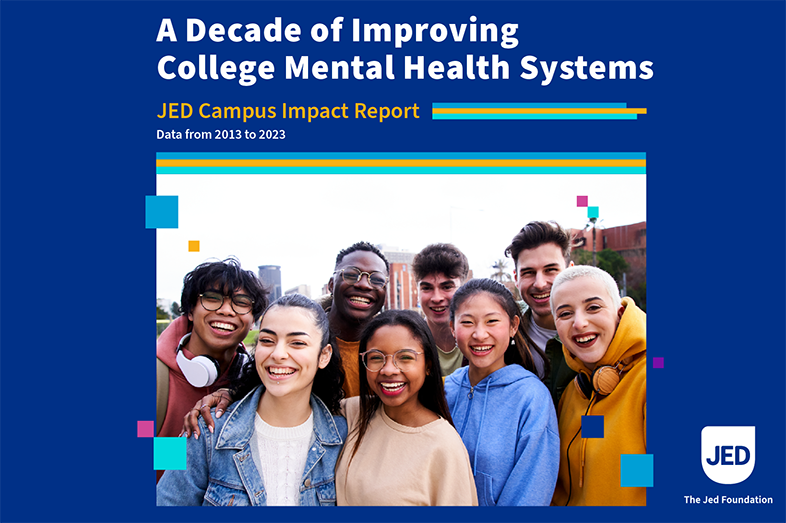April 18, 2024, NEW YORK CITY — The Jed Foundation (JED), a leading nonprofit that protects emotional health and prevents suicide for our nation’s teens and young adults, released a new report today revealing a significant decline in suicidal ideation, planning, and attempts among students attending colleges and universities that participated in the JED Campus program.
A Decade of Improving College Mental Health Systems: JED Campus Impact Report analyzed a decade of data (2013 to 2023) from JED Campus schools and the Healthy Minds Network survey. Schools that completed JED Campus saw statistically significant improvements in student mental health at the end of the program. Students were:
- 25% less likely to report a suicide attempt
- 13% less likely to report suicide planning
- 10% less likely to report suicidal ideation
Students also had improved average anxiety and depression scores, and were more likely to stay in school and graduate.
Launched in 2013, JED Campus is a four-year, technical assistance program that provides colleges and universities with expert support, evidence-based recommended practices, and data-driven guidance. To date, more than 440 colleges and universities have participated in JED Campus, reaching at least 5.6 million students.
“It’s no secret that many young people in this country are struggling with mental health, and have been for some time,” says John MacPhee, JED’s Chief Executive Officer. “It’s critical to understand that behind these data points, we are talking about young people whose lives have been saved by receiving the support and care they deserve — and we don’t take that lightly. These numbers inspire us to continue the work we are doing every day at colleges and universities, and we are proud of the profound and actionable impact of our JED Campus program.”
More than 18 million people attend colleges and universities in the U.S. every year, putting academic institutions at the forefront of bringing mental health initiatives directly to young adults to help prevent suicide and lower the incidence of anxiety and depression. According to the 2022–2023 Healthy Minds Study, 14% of college students nationwide reported suicidal ideation, 6% reported making a suicide plan, and 2% reported a suicide attempt in the past year. With that context, the report’s findings show that tens of thousands of students across JED Campus schools experienced mental health benefits.
“The JED Campus Program is about more than responding to mental health crises,” says Dianna Graves, Vice President for Student Affairs at Claremont McKenna College in Claremont, California. “It is also about proactively considering the many factors that impact college students’ wellness and then working across the college to mitigate challenges and to amplify strategies that work.”
In addition to student-level improvements, the results show school-level gains, with even more progress at schools that implement an increasing number of JED’s recommendations. View and download A Decade of Improving College Mental Health Systems: JED Campus Impact Report.
Interviews can be scheduled with JED representatives to discuss the report’s results, as well as JED Campus administrators, staff, and students to highlight the program’s positive impact and measurable improvements.
About The Jed Foundation (JED)
JED is a leading nonprofit that protects emotional health and prevents suicide for our nation’s teens and young adults. We’re partnering with high schools and colleges to strengthen their mental health, substance misuse, and suicide prevention programs and systems. We’re equipping teens and young adults with the skills and knowledge to help themselves and each other. We’re encouraging community awareness, understanding, and action for young adult mental health.
Connect with JED! Email | X (formerly Twitter) | Facebook | Instagram | YouTube | LinkedIn | Snapchat | Pinterest | TikTok
###
Media Contact
Justin Barbo
Director of Public Relations, The Jed Foundation
justin@jedfoundation.org
media@jedfoundation.org
FINN Partners
JEDteam@finnpartners.com
This is a sponsored message and does not necessarily represent the views of the Education Writers Association, its board of directors, or its members. Want to see your release on the EWA site? Promote it with EWA.
